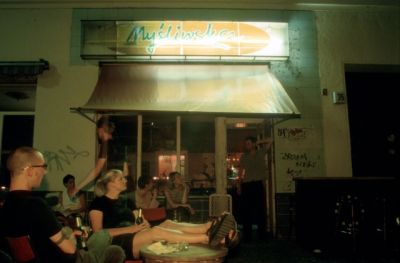The Buchbund – The German-Polish bookshop in Berlin

The German-Polish bookshop “Buchbund” has existed since October 2011 and is now an established fixture in the map of “Polish” Berlin. There are so many cultural events and literary meetings here that the Buchbund is increasingly regarded as an alternative Polish Institute. It is not only popular amongst Poles.
The idea of setting up a German-Polish bookshop in Berlin was born long before the first books arrived on the shelves in Sanderstraße 8 in the multicultural suburb of Neukölln. The Pole, Marcin Piekoszewski, and his German wife Nina Müller, who run the Buchbund, dreamt of a place where people could meet and have lively discussions, not necessarily about literature. Both of them have a very particular fondness for such places: when all’s said and done the couple got to know each other in a bookshop in Kraków.
But there was another, more basic reason for their opening the Buchbund. Berlin is, a city with 3,500,000 inhabitants, of whom 180,000 are Poles or of Polish origin, the second largest group of migrants after Turks. But whereas it was no problem to purchase books in Japanese, Persian, Russian, French, and in the Scandinavian languages, not to speak of English and American books, there was not a single bookshop which specialised in Polish books. Looking back over the years there has been only one Polish bookshop in Berlin: in the 1980s. It was a meeting place for Poles to discuss current political issues and purchase books from Poland, not only those officially allowed by the Communist state but also books that were banned. It is not clear who came up with the name “Buchbund”. The owners of the bookshop still argue about it, but they are unanimous in agreeing that it wasn’t the meaning of the name they liked, but rather its sound.
The opening of the shop in October was a success. The Buchbund quickly made a name for itself as an address that was not only popular amongst Poles but also amongst Germans looking for German translations of Polish literature or seeking information on Poland before their first visit. Since the Buchbund is growing increasingly popular with other foreigners living in Berlin it has now expanded its range to include books in the English language.
The bookshop probably not only owes its reputation to the long list of books available here but also and above all to its warm and friendly atmosphere. Its comfortable armchairs and the wooden table in the middle of the room that invites people to strike up conversations, is more reminiscent of a family home. Next door there is a small bar where you can order coffee, tea and other drinks. The rough bare walls covered in pictures and posters underline the informal atmosphere.
The immediate surroundings of the bookshop are not typical. The majority of shops are cheap stores selling textiles and household goods. Nearby there is a club for immigrants from Arabian countries that is only open to men: in addition there is a hair removal salon and a number of restaurants. Indeed you might think that this was a somewhat inauspicious neighbourhood for an indisputably cultural establishment like the Buchbund. That said, the German-Polish bookshop fits in perfectly with the multicultural mishmash in Neukölln.
In the minds of Poles living in Berlin the Buchbund is not simply a place to buy books, but equally an events venue where German translations of Polish books are presented as soon as they appear on the market, alongside books by German authors dealing with Polish issues. Its programme of events featuring Polish reportage authors and poets, and its discussions on current social issues in Poland, enjoy great popularity. The Buchbund has already played host to Jacek Hugo-Bader, Dorota Masłowska, Anda Rottenberg, Artur Becker, Ziemowit Szczerek, Brygida Helbig, Uwe Rada, Krzysztof Niewrzęda and many others. Sometimes the demand for tickets is so huge that people have to reserve a seat. Anyone arriving on the spur of the moment then has to reckon with standing only places.
The range of events to date has culminated in the Buchbund publishing its contents in book form. In 2015 it published “Polnisch poetisch”, containing interviews by the well-known translator Esther Kinsky with six poets, Dariusz Sośnicki, Jacek Gutorow, Magda Podgórnik, Adam Widemann, Katarzyna Fetlińska and Jakobe Mansztajn. In 2017 the bookshop published “Perigraphien. Europas Ränder – Europas Mitte”, containing conversations between the literary scholar and writer, Lothar Quinkenstein with other scholars on the life and work of Debora Vogel, Itzik Manger and Arnold Słucki.
The Buchbund has now also become a meeting point for a number of Berlin grassroots initiatives. There are regular meetings of translators, of the German-Polish “O!buch” club, the “Salonik 1-2-3” for children of Polish families, as well as Polish and Yiddish courses.
The huge number of diverse Buchbund events has led to an increasing number of people calling the shop an “alternative Polish Institute”. And even if Marcin Piekoszewski disputes this, and prefers to regard his bookshop simply as an extension to the Institute, the Buchbund’s epithet will probably never disappear.
Monika Stefanek, August 2017
The Buchbund address:
Sanderstraße 8
12047 Berlin
www.buchbund.de











